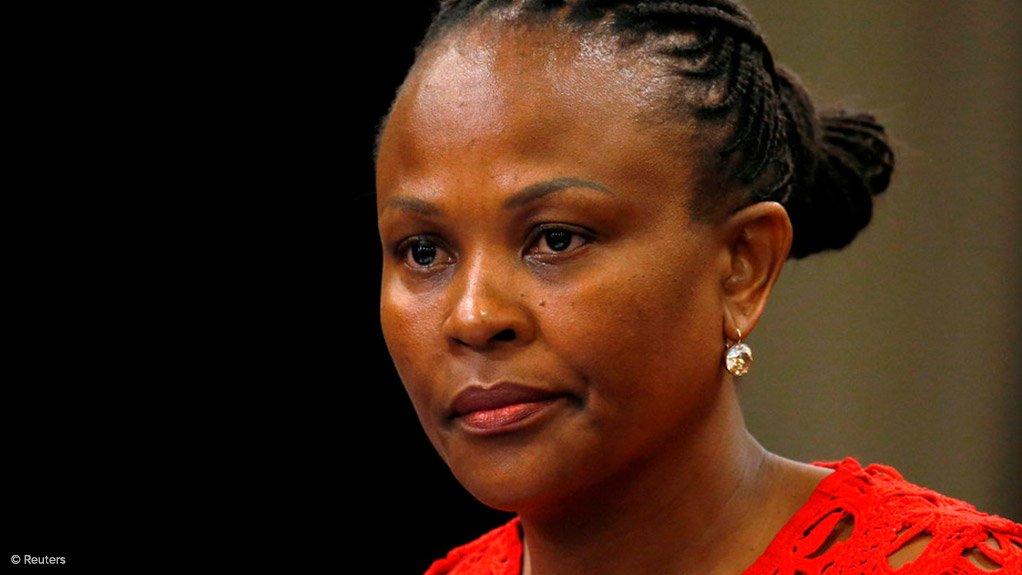The South African Reserve Bank (Sarb) has applied for a declaratory order from the North Gauteng High Court that Advocate Busisiwe Mkhwebane abused the office of the Public Protector, and wants her to pay legal costs independently.
This was revealed in Sarb’s responding affidavit on Monday, which accused Mkhwebane of making false statements in a back-and-forth legal tussle over her report into Sarb’s Bankorp bailout in the 1990s.
Mkhwebane's report earlier in 2017 found that Sarb’s R1.125-billion bailout of Bankorp between 1985 and 1995 was unlawful and that ABSA – which bought the bank in 1992 – should pay back the money.
The report saw ABSA and Sarb seek a court review of the report, which has seen a back-and-forth of court papers.
Mkhwebane broke 'virtually every rule'
In the latest responding affidavit, Sarb has accused Mkhwebane of breaking “virtually every rule that applies to an organ of state when its decision is taken on review”.
“This conduct is unbecoming of the important office that Ms Mkhwebane occupies,” Johannes de Jager, Sarb’s general counsel in its legal services department, said on behalf of Sarb in the affidavit. “It amounts to an abuse of her office.”
The Reserve Bank is asking the court to order Mkhwebane to pay costs out of her own pocket, and a declaratory order from the court that she has abused her office.
“The request for the declaratory order should not come as a surprise to the Public Protector,” he said.
De Jager said Mkhwebane dragged the process on for four months and left Sarb with this past weekend to respond.
“This greatly truncated time period is a result of the Public Protector having taken almost four months from the date on which this application was launched, and more than two and a half months from receipt of the Reserve Bank's supplementary founding affidavit, to prepare her answering affidavit,” he said.
“The answering affidavit is an abuse of process.”
Mkhwebane 'made false statements'
Furthermore, he said Mkhwebane's last affidavit contains false statements.
“For example, in the second paragraph of the affidavit Ms Mkhwebane says that where she makes averments (formal statements) relating to economics in her affidavit, she does so ‘on the basis of advice received from economic experts during the investigation of the complaint referred to below’ (emphasis added).
“The averments in the affidavit about economics are not based on advice received during the Public Protector's investigation. There is no reference to these in the record of proceedings filed in accordance with Rule 53.
“They are clearly based on the views of Dr Mokoka, who did not advise the Public Protector during the investigation. There is no reference to Dr Mokoka or his views in the report. On the Public Protector's own version, Dr Mokoka was engaged ‘following receipt of the three review applications . . . to consider the true nature of the Lifeboat schemes’.
“As a matter of law, the Public Protector may not manufacture new reasons for her remedial action. She has breached this principle by presenting an entirely new justification of her report in her answering affidavit.”
Why Mkhwebane allegedly failed her duties
De Jager said Mkhwebane’s response has not been candid or forthright. “As an organ of state, the Public Protector has heightened obligations in litigation.
“She is required to be frank and candid with the court and to explain her conduct in a transparent and accountable manner. Ms Mkhwebane has not done so.
“She has failed meaningfully to address the very serious accusations against her that she is biased against the Reserve Bank and pursued an ulterior purpose in her investigation.
“She adopted the antithesis of a fair process. She did not afford those parties most affected by the new remedial action in her final report an opportunity to comment on the remedial action, whilst affording parties who had no legitimate right to be heard an audience.
“This grave want of fairness exposes the bias of the Public Protector in relation to the Reserve Bank, and renders her entirely incapable of treating the Reserve Bank in a fair manner - a further reason why there should not be a remittal of the matter to the Public Protector.”
What the review should focus on
De Jager said the failure means that the review of the report should be decided on the following:
1. “The Public Protector met with the State Security Agency and the former Minister of State Security on 3 May 2017 and discussed amongst other things, the vulnerability of the Reserve Bank.
2. “The Public Protector had not one, but two, meetings with the Presidency after receiving comments on her preliminary report and in circumstances where she had no other meetings with the parties most affected by the new remedial action in her report.
3. “The Public Protector failed to disclose that she had had these meetings with the Presidency when she issued her report.
4. “The Public Protector failed to keep a transcript of these meetings when it is routine practice within her office to record her interviews.
5. “The Public Protector evidently discussed amending the Constitution with the Presidency to take away the Reserve Bank's primary function - a topic that bore no relation to her investigation and which a court has already set aside as unconstitutional.”
Why Bankorp report should be set aside
De Jager said Mkhwebane’s report into Bankorp should be set aside.
“It was the product of a procedurally unfair process and is underpinned by irrationality and errors of law and fact. There is no basis for a remittal to her to continue with the investigation.
“On the contrary, the evidence of her investigation shows that it pursued an ulterior purpose and was improper.
“A declaratory order that the investigation abused the powers of her office ought, accordingly, to be granted.”
EMAIL THIS ARTICLE SAVE THIS ARTICLE
To subscribe email subscriptions@creamermedia.co.za or click here
To advertise email advertising@creamermedia.co.za or click here











